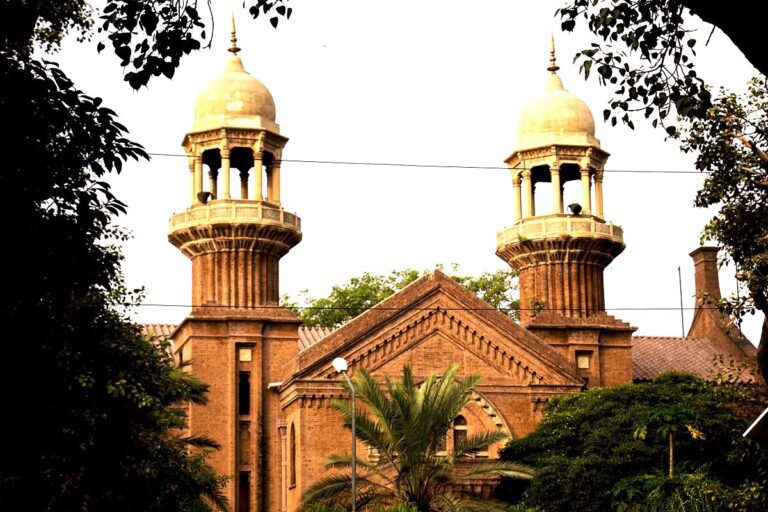Pakistan’s High Court has granted bail to a Christian woman jailed for more than a year on false blasphemy charges, her lawyer announced.
Christian lawyer Lazar Allah Rakha said on Thursday (November 6) that Lahore High Court Judge Asjad Jaid Gulal had granted bail in two blasphemy cases filed against 29-year-old Stella Khawar as there was no evidence against her.
Raka said Article 497 of the Code of Criminal Procedure entitles suspects to be granted bail on statutory grounds if there has been no substantial progress towards the conclusion of the trial and the defendant is not responsible for undue delay.
Ms. Khawar, a mother of a five-year-old son, was arrested on May 12, 2024 from Karota Shedan in Kotli Loharan area of Sialkot district in Punjab and booked under Section 295-A of Pakistan’s Blasphemy Act and Section 505 of Pakistan Penal Code, which are widely condemned in relation to hurting religious sentiments.
Rakha said the local leader of the now-banned extremist religious party Tehreek-e-Labbaik Pakistan (TLP) had named her in two cases through supplementary statements after banknotes were allegedly found with blasphemous inscriptions in two separate incidents on August 27, 2023 and January 7, 2024.
Article 295-A requires 10 years’ imprisonment for those found guilty of intentionally disturbing religious sentiments, while Article 505 relates to intentionally causing fear in the public and disturbing public tranquility and is punishable by up to 7 years’ imprisonment.
In his ruling on both petitions, Gulal pointed out that Qawal’s involvement in both cases was based solely on the charges leveled by the main prosecution witness, Hafiz Saeed Furqan Ijaz, according to Raqa.
“Furthermore, even after nearly two years, the police have not submitted a forensic report of the CCTV footage of the woman allegedly throwing the blasphemous object on the street,” he said. “During the bail proceedings, the High Court noted that the woman could not be accurately identified in the grainy footage and repeatedly asked investigators to submit a forensic report, which was not submitted.”
Lawyers said the high court ordered Khawar’s release on bond worth 200,000 Pakistani rupees ($706) in each of the two cases because of insufficient evidence and undue delays in completing the trial. Her family has arranged for a guarantor and hopes to be reunited with her this week, he added.
Mr Raka, who has successfully defended several people wrongly accused of blasphemy, said he was grateful to the legal aid group Alliance Defending Freedom (ADF) International for funding legal aid and defending Mr Khawar.
“Stella’s family is poor and due to safety concerns, they have not been able to get proper legal representation for their daughter, whose trial is being held at Sialkot District Jail,” Raka told Christian Daily International Morning Star News. “As the High Court has pointed out, this is clearly a case where there is no evidence, so I am very hopeful that we will be able to acquit her in both cases at the upcoming hearing.”
Since 1990, dozens of people have been extrajudicially killed in Pakistan over accusations of blasphemy and crimes. Rights groups have repeatedly criticized and called for reform or repeal of the harsh laws, which date back to the days of the British Empire. Other penalties include fines or jail time depending on the specific crime.
Federal Minister of Law and Human Rights Azam Nazir Tarar announced on October 16 that the government will introduce procedural safeguards to prevent abuse of the law and ensure timely justice by ensuring fair investigation and judicial consideration in blasphemy-related cases.
Human Rights Watch (HRW) said in a June 9 report that Pakistan’s blasphemy laws are being systematically abused to target religious minorities, dispossess the poor, and settle personal and economic disputes.
The 29-page report, “Land-grab conspiracy: Exploiting Pakistan’s blasphemy laws for intimidation and profit,” states that “blasphemy charges are increasingly being weaponized to incite mob violence, displace vulnerable communities, and confiscate property with impunity.”
The report said in some cases blasphemy accusations were used to target business rivals or force them to transfer property. HRW added that the law’s broad and vague provisions allow it to be exploited with minimal or no evidence, creating a climate of fear among vulnerable populations.
HRW criticized Pakistan’s criminal justice system for enabling these abuses. Authorities rarely held perpetrators of mob violence accountable, but police often failed to protect suspects or investigate charges, the report said. In some cases, the intervening officers themselves may face threats. Political and religious activists accused of inciting violence often evade arrest or are acquitted due to lack of political will or intimidation.
Pakistan was ranked eighth on Open Doors’ 2025 World Watch List of the 50 most difficult countries to be a Christian.
